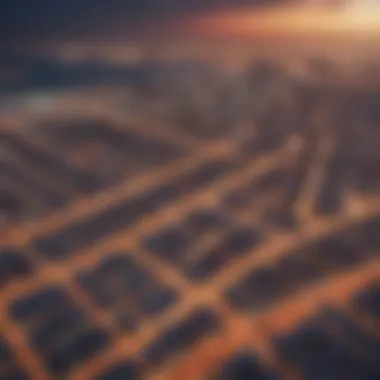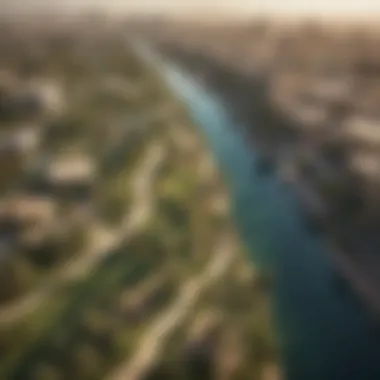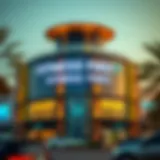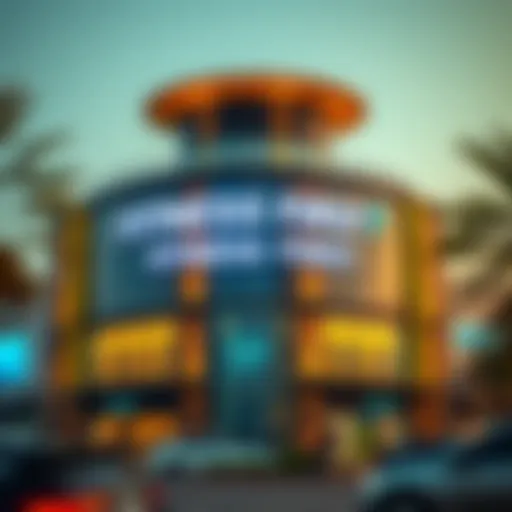Jebel Ali City: Navigating Dubai's Urban Growth


Intro
Jebel Ali City stands as a remarkable fusion of modern urban planning and a sense of community deeply rooted in tradition. Situated along the southwestern coast of Dubai, this rapidly expanding urban locale has captured the interest of many—for good reason. Its charm is not just in the architectural marvels that grace the horizon, but also in the unique lifestyle it offers to its residents.
From its humble beginnings as a port area to its evolution into a vibrant hub for commerce and residence, the city has continually attracted people from diverse backgrounds. In this exploration, we will shed light on the neighborhoods that define Jebel Ali City, examining their features and the role they play in shaping the community.
Neighborhood Features
Landscaping Highlights
The charm of Jebel Ali City can be partly attributed to its thoughtful landscaping. Green spaces dotting the area encourage a lifestyle that embraces the outdoors. Parks like Jebel Ali Park not only serve as recreational grounds but also foster community interactions. The meticulous planning has led to the incorporation of native flora, which not only beautifies the landscape but makes it sustainable in the tough climate.
- Green Corridors: Walkways interlinking neighborhoods promote a pedestrian-friendly environment, making it easier for residents to explore the area on foot.
- Water Features: Lakes and ponds add a serene touch, where families can relax or engage in activities like fishing or picnicking.
- Community Gardens: These spots serve as a great initiative for bit of agriculture, letting residents cultivate their own plants and vegetables.
Architectural Styles
The architectural landscape of Jebel Ali City is a study in contrast, where modernity meets practicality. Residents are welcomed into an array of housing styles, from contemporary villas to spacious townhouses, accommodating families of different sizes and preferences.
- Contemporary Designs: Many buildings showcase cutting-edge designs with eco-friendly materials, reflecting global architectural trends.
- Cultural Influences: Elements of Islamic architecture are seamlessly woven into some structures, paying homage to the region's heritage.
- Residential Communities: Development projects like the Jebel Ali Village emphasize a sense of community through their layout, offering amenities that cater to an active lifestyle.
Community Life
Local Events and Activities
Life in Jebel Ali City is vibrant, fueled by an array of local events and activities that adjust to the seasons and multicultural ethos of its residents. Regular community gatherings foster a robust social fabric, strengthening connections among neighbors and families alike.
"In Jebel Ali City, there is always something happening. Be it market days, festivals, or family-friendly activities, the community comes alive with every event."
- Festivals: Annual gatherings often celebrate local culture, showcasing food, music, and art.
- Markets: Pop-up markets offer a platform for local artisans to display their crafts, creating a sense of support and commerce.
- Fitness Events: Outdoor yoga sessions and sports tournaments encourage active participation from all age groups.
Lifestyle Amenities
At the heart of Jebel Ali City's appeal lies its diverse lifestyle amenities, designed to cater to the diverse tastes and needs of its residents. Shopping, dining, and recreation are all conveniently accessible, creating a self-sustained community.
- Shopping Centers: With venues like IBN Battuta Mall nearby, residents have a wealth of high-end and local shops at their doorstep.
- Dining Options: A mix of international cuisines represents the multicultural makeup of Jebel Ali, giving options from casual snack bars to elegant dining experiences.
- Recreational Facilities: Gyms, swimming pools, and sports complexes ensure that fitness enthusiasts can maintain their routines without traveling far.
In these intricate neighborhood dynamics and community offerings, one can see how Jebel Ali City is not just a place to live, but a community that thrives, evolves, and fosters a sense of belonging.
Prelims to Jebel Ali City
In the bustling landscape of Dubai, Jebel Ali City stands out as a microcosm of urban evolution. This part of the emirate has seen rapid development, attracting a blend of diverse communities. It represents a confluence of history and modernity, where advanced infrastructure coexists with rich cultural roots. This overview sets the stage for discussions on urban development, economic significance, and lifestyle offerings, laying bare not just what makes Jebel Ali unique, but also why it matters within the greater context of Dubai.
Understanding Jebel Ali City is crucial for homeowners, potential residents, urban planners, and architects. It offers insights into how modern cities evolve, the planning principles that drive them, and the challenges they face along the way.
Geographical Overview
Jebel Ali City is located on the southwestern edge of Dubai, near the coast of the Arabian Gulf. Spanning over a substantial area, it serves not only as a residential enclave but also as an economic hub, home to the Jebel Ali Port, one of the largest and busiest ports in the world. The strategic position of the city aids in facilitating trade and commerce, acting as a gateway to international markets.
The architecture in this area reflects a modern aesthetic, with sprawling villas, high-rise buildings, and expansive commercial complexes. Accessibility plays a significant role in its desirability; well-planned road networks connect it to the rest of Dubai, including proximity to Sheikh Zayed Road, making the city easy to navigate.
A notable feature in the geographical layout is the lush focus on green spaces amidst the urban fabric. Parks and recreational areas not only enhance the visual appeal but also provide residents a breath of fresh air, an important aspect in a city known for its high temperatures.
Historical Context
The historical significance of Jebel Ali is closely tied to its early development as a port city. Initiated in the late 1970s, the area was strategically chosen to support Dubai’s ambition to become a commercial powerhouse in the region. The establishment of the port marked a turning point, attracting businesses and creating a workforce seeking employment.
The early days were marked by a sense of optimism, as investors saw opportunity where once there was little. Growing from a barren coastline, Jebel Ali evolved rapidly, reflecting Dubai’s broader growth narrative characterized by ambition and vision.
As the 1980s rolled in, various industries flourished in Jebel Ali, including manufacturing, logistics, and hospitality. This diversification laid the groundwork for the rich tapestry of economic activity that defines the city today.
In summary, Jebel Ali City is not just a place on the map but a vital part of Dubai’s urban narrative. Its geographical advantages and historical development provide a multifaceted understanding of what this city has become and what future it holds for newcomers and long-term residents alike.
Urban Development and Planning
Urban development and planning serve as the backbone of any expanding city, and Jebel Ali is no different. The thoughtful arrangement of infrastructure, residential zones, and public spaces plays a monumental role in shaping the community's dynamic. It's not just about erecting buildings or laying roads; it's about fostering a sense of belonging and facilitating the daily lives of residents. In the context of Jebel Ali, these aspects encapsulate opportunities for economic growth and improvements in living standards, thus making this segment essential in understanding the city's evolution.
Infrastructure and Connectivity
Road Networks
When talking about road networks in Jebel Ali, one can't overlook their sheer significance to the city's functionality. The road system is extensive, connecting diverse areas while ensuring smooth mobility for vehicles and pedestrians alike. It’s like the veins of the city, pumping life into various neighborhoods. The major highways, such as Sheikh Zayed Road, serve not only Jebel Ali but also much of Dubai and beyond, showcasing how integral these infrastructures are to broader connectivity.
A key characteristic of Jebel Ali’s road networks is their capacity to handle heavy traffic. This robustness is due to strategic planning and the foresight to incorporate multi-lane highways that can accommodate the burgeoning population and increasing visitor numbers. What stands out is the thoughtful mix of public and private access routes, giving residents multiple options for commuting.


However, while the road networks enhance accessibility, they aren’t without challenges. During peak hours, traffic congestion can spill over, leading to frustrating delays, which might dissuade potential residents who prioritize convenience. Thus, while road systems have their merits, they also call for ongoing attention and improvement.
Public Transport Options
Public transport options in Jebel Ali present a highly practical aspect of the urban landscape. The city boasts several modalities of transportation, including buses and a planned metro extension that will add connectivity to this flourishing suburb of Dubai. The advantage of a well-developed public transport network is evident, as it presents a viable alternative to private vehicles, reduces traffic congestion, and minimizes the environmental footprint.
A key feature of Jebel Ali's public transport system is its integration with Dubai's overall transit network. This interconnectedness means that residents can easily transition from buses to the metro, which is both time-efficient and cost-effective. The accessibility of various modes—whether one is hopping on a bus to reach a shopping destination or connecting to the metro for a commute to work—underscores the benefit of having diverse transport options.
Nevertheless, public transport also has its drawbacks. While it’s designed to be comprehensive, areas further from central hubs may experience less frequent services, causing inconvenience for some commuters. As Jebel Ali continues to grow, addressing these shortcomings in public transport offerings will be fundamental in maintaining quality of life.
Zoning Regulations and Land Use
The zoning regulations and land use policies in Jebel Ali represent a structured approach to urban planning. These guidelines dictate how land is utilized, ensuring that various segments are designated for residential, commercial, or industrial purposes. Such regulations are integral in optimizing space and ensuring that diverse needs of the community are met. A well-considered zoning strategy can promote economic activity while balancing residential tranquility—an essential consideration for current and potential homeowners.
By establishing zones for specific types of developments, planners can curate communities that enhance synergy among living spaces, work areas, and recreational facilities. For example, having residential areas near commercial hubs reduces travel time for residents and encourages local business growth. These careful considerations showcase the city's commitment to building an urban fabric that promotes well-being in daily life.
In sum, urban development and planning in Jebel Ali encapsulate thoughtful organization and foresight. Whether it's through road networks or public transport services, the infrastructure paves the way for economic vitality and a better quality of life for its residents. As the city continues to metamorphose, ongoing attention to zoning regulations will also ensure sustainable growth and community cohesion.
Economic Significance
Understanding the economic significance of Jebel Ali City is crucial for anyone interested in the dynamics of urban growth. This area is not just another recreational hub or residential district; it plays a pivotal role in the broader economic landscape of Dubai and the UAE as a whole. The importance of Jebel Ali City can be seen in its strategic location, which serves as a key component of the region’s trade and logistics framework, connecting businesses to global markets. It’s essential for potential homeowners, urban planners, and investors to recognize how these attributes contribute to economic vitality.
Key Industries
Jebel Ali City is home to several key industries that shape its economic fabric. Logistics and Transport are arguably at the forefront, thanks to the Jebel Ali Port, which is one of the largest in the world. This port is crucial for trade and serves countless vessels every year, playing a significant role in facilitating commerce and enhancing economic ties.
Other significant industries in the area include:
- Manufacturing: Jebel Ali Free Zone attracts many companies due to its favorable regulations and infrastructure. Large-scale manufacturers find this area ideal for operations.
- Technology and Innovation: The city is increasingly known for tech start-ups and research facilities, a trend that aligns with Dubai's ambition of being a tech hub.
- Tourism and Hospitality: With its expanding residential communities and recreational offerings, Jebel Ali invites investors in the hospitality sector, growing its tourism footprint.
The economic muscle of these industries underpins not only local employment opportunities but also broader economic diversity across the UAE.
Investment Opportunities
With Jebel Ali City emerging prominently on the investment map, there’s an abundance of opportunities for potential investors. The real estate market within this area is particularly attractive, fueled by ongoing demand for residential and commercial properties. The trend is toward sustainable living, and developments that emphasize energy-efficient designs are gaining traction.
Investors keen on capitalizing on future growth might look at:
- Residential Projects: With a variety of housing options from luxurious villas to modest apartments, there's something for every budget.
- Commercial Developments: Retail and office spaces in strategic locations offer profitable investment avenues.
- Joint Ventures: Collaborating with established local firms can ease navigation through local regulations and boost prospects.
"Investing in Jebel Ali is not just a bet on the present, but a strategic move for a better future."
The combination of a robust economy, solid infrastructure, and hospitality-focused developments makes Jebel Ali an ideal candidate for long-term investment. As urban planners and economic strategists keep a close watch, this area's importance in Dubai's economic landscape will only intensify.
Residential Communities
When one thinks about a thriving urban area, the concept of residential communities often takes center stage. In Jebel Ali City, the residential landscape plays a pivotal role, influencing not just the housing market but also the overall vibe and community spirit. These neighborhoods are vital for attracting diverse populations, enriching the cultural fabric, and furnishing essential amenities for residents. Understanding the different facets of residential communities provides valuable insights for homeowners, urban planners, and potential investors alike.
Diverse Living Options
Types of Housing
In Jebel Ali City, the types of housing available present a tapestry of choices, each catering to varying preferences and budgets. From luxurious villas to modern apartments, the housing landscape offers something for everyone. For instance, gated communities like Arabian Ranches and Dubai Hills are hugely popular, providing an upscale living experience with exclusive amenities like private pools and landscaped gardens.
On the other side of the spectrum, there are affordable apartment complexes that foster a sense of community through shared facilities such as gyms and play areas. This mix enhances the attractiveness of Jebel Ali, making it appealing for families, young professionals, and retirees.
One unique feature is the rise of eco-friendly homes, designed with sustainability in mind. These homes utilize energy-efficient technologies, which align with the growing interest in green living. However, the trade-off can be the slightly higher upfront investment compared to traditional housing. Whether seeking luxury or affordability, the diversity in housing types ensures that Jebel Ali City caters to a wide audience.
Affordability and Pricing Trends
Affordability is a critical consideration for anyone looking to settle in Jebel Ali. The pricing trends in the residential market indicate a steady rise in property values, particularly in sought-after areas. Many homebuyers are keen on identifying up-and-coming neighborhoods where they can find great value before prices soar further.
A salient characteristic of these trends is the relative balance it strikes between quality and accessibility. While there are high-end properties available, many middle-class families are finding suitable housing that fits within their budgets. Notably, the variance in property prices means that savvy buyers can often secure good deals by keeping a close watch on the market.
The unique aspect of affordability here is its fluid nature; prices sometimes fluctuate based on market demand and the ongoing development of the area. Homeowners who buy during quieter periods often experience the advantage of appreciating asset values as the city continues to grow. This blend of affordability and quality contributes substantially to the residential appeal of Jebel Ali.
Community Facilities
Schools
Access to quality education is a must for families considering moving to Jebel Ali City, and the availability of well-regarded schools stands as a significant draw. With several international schools offering diverse curricula—like the British, American, and the International Baccalaureate—parents have a vast selection for their children's education.
The key characteristic of these schools is their emphasis on not just academic excellence but also extracurricular activities, helping students develop holistically. This broad spectrum makes Jebel Ali a desirable location for families with children, as education is often a top priority for parents.


However, a notable challenge is the demand; popular schools often have long waitlists, meaning parents must act fast to secure spots. Despite this, the investment in high-quality education facilities furthers the attractiveness of the community.
Healthcare Services
Healthcare services in Jebel Ali City are another crucial component that significantly elevates its livability. Numerous clinics and specialized hospitals serve residents with a range of medical needs. For example, Saudi German Hospital is a top-tier facility providing comprehensive care, while diverse local clinics cater to minor ailments swiftly and affordably.
A primary characteristic of health services here is the emphasis on accessible yet high-quality patient care. With many healthcare professionals trained in established institutions, residents often express confidence in the available medical services. Moreover, the establishment of wellness centers promotes a proactive approach to health, often focusing on preventive care.
Despite this excellent availability, some residents might find wait times for specialized services to be on the longer side during peak hours. Yet, overall, the robust health facilities contribute to a more complete quality of life in Jebel Ali.
Investing in Jebel Ali not only means securing a home but also ensuring a lifestyle wrapped in convenience, community, and a shared vision for the future.
Lifestyle Features
Lifestyle features are an integral part of any urban setting, acting as the glue that binds the community together while enhancing the quality of life for its residents. In Jebel Ali City, the lifestyle offerings are diverse and varied, catering equally to families, young professionals, and retirees. By acknowledging these features, the article not only sheds light on what makes Jebel Ali a desirable locale but also underscores how these elements contribute to the broader tapestry of Dubai's urban landscape.
Recreational Spaces
Parks and Green Areas
Parks and green areas in Jebel Ali City are essential for promoting a healthy lifestyle and fostering community relations. These spaces offer a breath of fresh air amidst the bustling urban environment. One standout characteristic of parks in the area is their well-maintained landscapes, which encourage outdoor activities and family gatherings. These parks provide a peaceful escape from the urban hustle, making them a popular choice among residents.
Notable features include walking trails, children’s play areas, and picnic spots, allowing families to engage in various leisure activities. Furthermore, the presence of trees and plants contributes to better air quality and creates a soothing atmosphere. However, one challenge is that, during peak times, these parks can become overcrowded, diminishing the tranquil experience that many seek. Overall, parks and green areas play a critical role in enhancing residents' quality of life in Jebel Ali City.
Sports Facilities
The sports facilities in Jebel Ali City are another layer of the lifestyle features that cater to both fitness enthusiasts and casual sports aficionados. Many of these facilities are designed to promote a sense of community through sports and fitness events. A key characteristic is their state-of-the-art equipment and amenities, which encourage residents to lead active lifestyles. These spaces are often equipped with swimming pools, tennis courts, and gymnasiums, catering to a wide range of athletic interests.
A unique aspect of these facilities is their accessibility, making it easy for people of all ages to participate in activities. Benefits include enhanced physical health and social interaction, which are vital for community building. On the downside, some facilities may charge fees that not all residents can afford, potentially limiting inclusivity. Nevertheless, sports facilities stand as a vital aspect of Jebel Ali's lifestyle offerings, fostering well-being and camaraderie among residents.
Shopping and Dining
Local Markets
Local markets in Jebel Ali City provide a vibrant shopping experience that reflects cultural diversity and community spirit. These markets, often characterized by their lively atmosphere, not only cater to everyday needs but also promote local businesses. Shoppers can find everything from fresh produce to artisanal goods, offering a unique take on shopping compared to larger malls.
A significant feature is their affordable pricing, allowing residents to enjoy the perks of fresh and locally-made goods. Additionally, these markets often host events that engage the community, further solidifying their relevance. However, like many local spots, they may sometimes lack the variety found in larger retail chains. Still, the charm and character of local markets make them a noteworthy aspect of Jebel Ali’s lifestyle offerings.
Dining Options
Dining options in Jebel Ali City are characterized by their eclectic mix of cuisines, reflecting the multicultural backdrop of Dubai. From quaint cafés to upscale restaurants, these dining spots cater to a broad array of tastes and preferences. A standout aspect is the emphasis on family-friendly environments, making them suitable for gatherings and special occasions.
Many establishments pride themselves on using fresh ingredients sourced from local markets, enhancing the overall dining experience. Unique features, such as open-air seating and themed nights, present additional allure. However, some diners may find certain establishments to be on the pricey end, which might deter budget-conscious residents. Regardless, the diverse dining landscape generously contributes to the lifestyle appeal of Jebel Ali City.
Cultural Aspects
The cultural fabric of Jebel Ali City is woven from the threads of its diverse community, history, and the various traditions embraced by its residents. These cultural aspects provide a framework for social interactions and create bonds among the inhabitants, which is paramount for an area that is continually evolving. Understanding the cultural dynamics here uncovers not just the identities of individuals, but also the collective spirit that propels community involvement and growth.
Diverse Community Life
In Jebel Ali, the diversity of its community stands out as one of its most remarkable characteristics. Many nationalities are represented, creating a rich tapestry of customs, languages, and traditions. This mix is not just a superficial aspect but penetrates deep into daily life, influencing everything from culinary choices to festivals celebrated.
The local residents often engage in cultural exchanges that enrich their lifestyles. For example, various ethnic restaurants sprinkle the area, offering everything from traditional Indian curry to authentic Lebanese dishes. These dining spots serve as both a culinary hub and a social gathering space. Residents frequently honor their heritage by hosting community events, sharing their food, music, and customs with others.
Moreover, the presence of many expatriates fosters a unique synergy — something that has led to the formation of clubs and community groups aimed at encouraging intercultural dialogue. When community members come together to celebrate holidays, it highlights how different backgrounds can unite under shared values of acceptance and understanding. This collaborative spirit not only defines Jebel Ali City’s ambiance but also gives a sense of belonging to its residents.
Cultural Events and Festivals
Throughout the year, Jebel Ali vibrates with exciting cultural events and festivals that reflect the diverse backgrounds of its inhabitants. These gatherings not only commemorate traditions but also serve as great opportunities for community bonding.
- Diwali Celebrations: One of the major festivities, especially among the Indian community, involves impressive displays of lights, food fairs, and colorful decorations. Local parks transform into enchanting festive venues with activities for families.
- Eid Al Fitr: Marking the end of Ramadan, this festival sees a flurry of activities, including gatherings, feasting, and communal prayers. It is a vital time for the Muslim community, emphasizing togetherness and charity.
- International Cultural Day: This event is a beautiful showcase of the various heritages that coexist in Jebel Ali. Residents set up booths representing different countries, sharing art, music, and performances that highlight cultural uniqueness. Through this, not only do participants exchange knowledge, but they create lasting friendships as well.
"The beauty of diversity in Jebel Ali lies not just in cohabiting, but in co-existence — where every moment counts, making the community feel vibrant and alive."
In summary, the cultural landscape in Jebel Ali City is vital. It shapes the daily lives of its residents and fosters a strong sense of community belonging, essential for a growing urban environment. As more people join this dynamic city, these cultural aspects are likely to evolve, promising a future where unity through diversity continues to thrive.
Environmental Considerations
Environmental considerations play a critical role in the planning and sustainability of urban landscapes, particularly in areas like Jebel Ali City. As the urban sprawl continues, balancing development with environmental stewardship becomes not just important—it's essential. These considerations influence everything from community health to biodiversity, effectively setting the stage for future generations.
Sustainability Practices
In an age where climate change is at the forefront of global issues, Jebel Ali’s approach to sustainability is noteworthy. For instance, initiatives aimed at reducing carbon footprints are on the rise. Many new buildings adhere to rigorous energy efficiency standards. Green building certifications, such as LEED, are increasingly common, aligning with international best practices. These buildings often feature energy-efficient systems, which significantly lessens their environmental impact.


Water management is another aspect where sustainability has taken root. The use of reclaimed water for landscaping reduces the strain on local aquifers. Communities are also encouraged to implement smart irrigation practices to minimize water wastage.
Furthermore, the development of solar energy projects has gained traction. Jebel Ali aims to harness the power of the sun, with solar panels installed in residential areas and public spaces, making use of the abundant sunshine in the region.
Landscaping Trends
The landscaping trends in Jebel Ali reflect a growing commitment to creating green spaces that serve multiple purposes—ecological, recreational, and social. Community parks are designed not only as aesthetic enhancements but as vital ecosystems. Planting native and drought-resistant species helps maintain local biodiversity while reducing water consumption.
Moreover, the introduction of vertical gardens and green roofs in residential complexes elevates both aesthetics and environmental benefits. These features contribute to cooler temperatures within buildings and help filter air pollutants, improving overall urban air quality.
A more holistic approach to landscaping includes the creation of wildlife corridors that interconnect parks and green spaces. This design encourages local wildlife to thrive and enhances community engagement with nature.
"By integrating sustainable practices in Jebel Ali’s development, we not only cater to the immediate residents but also to the future of the planet."
In essence, understanding the environmental considerations within Jebel Ali isn’t merely about compliance. It’s about setting a precedent. These principles, focusing on sustainability practices and landscaping trends, pave the way for a more resilient urban environment that can adapt to future challenges.
Challenges and Opportunities
Jebel Ali City is a vibrant urban space in the ever-evolving Dubai landscape. However, like any developing area, it is not without its hurdles. The dynamic nature of urban growth brings forth both challenges and opportunities that must be navigated thoughtfully. Understanding these can help homeowners, urban planners, and stakeholders harness the city's potential while mitigating risks.
Urban Challenges
As Jebel Ali City expands, several urban challenges emerge that need addressing to ensure sustainable growth. Infrastructure strain is perhaps the most pressing issue. With an influx of new residents and businesses, existing roads, networks, and services may become overwhelmed. This can lead to bottlenecks in transportation, affecting daily commutes and the overall quality of life.
Another noticeable challenge is environmental sustainability. While development can bring economic benefits, it can also lead to increased pollution and habitat loss. Balancing urban expansion with ecological preservation is crucial. For instance, the careful management of green spaces and water resources must be prioritized.
Here are some key urban challenges Jebel Ali City faces:
- Public transport integration: Ensuring that new projects align with public transit options is vital for reducing traffic.
- Affordable housing: The demand for housing is rising, so maintaining a variety of price points will be essential to cater to different income levels.
- Community engagement: Making sure that all voices are heard in the planning process can foster a sense of belonging and ownership among residents.
Future Development Prospects
In light of these challenges, the future development prospects for Jebel Ali City appear promising. With proactive urban planning, it can turn potential obstacles into stepping stones for success. The focus on smart city initiatives stands as a beacon of hope for improving infrastructure and citizen engagement. Smart traffic management systems, for instance, can alleviate congestion and improve safety.
Moreover, investment in renewable energy and sustainable practices can position Jebel Ali as a leader in environmental stewardship. Utilizing solar energy, green roofing, and waste management innovations can provide long-term benefits for the community.
The integration of mixed-use developments can also enhance community dynamics. By combining residential, commercial, and recreational spaces, developers can create vibrant neighborhoods that cater to diverse needs.
In summary, while Jebel Ali City faces significant urban challenges, the opportunities for innovative growth are abundant. With concerted efforts in planning, investment in sustainability, and ensuring community involvement, Jebel Ali can thrive as a model of contemporary urban living.
Comparative Analysis
In the realm of urban planning, a comparative analysis shines a light on the relative strengths and weaknesses of different neighborhoods. For Jebel Ali City, this analysis plays a crucial role in understanding its unique dynamics in Dubai's urban fabric. It offers insights into infrastructure, community life, and economic opportunities that the area presents compared to its neighbors. When residents, urban planners, and potential investors contemplate moving to Jebel Ali, this analysis can highlight critical factors that inform their decisions.
Jebel Ali vs. Other Dubai Neighborhoods
When comparing Jebel Ali to other neighborhoods in Dubai, several elements become clear.
- Infrastructure: Jebel Ali benefits from a well-built infrastructure compared to other areas like Dubai Marina or Downtown Dubai. The road networks are designed efficiently, which eases traffic congestion, particularly during peak hours.
- Residential Community: The communities are relatively quieter here. In contrast to the bustling streets of Bur Dubai or Jumeirah, you will find that Jebel Ali offers a more laid-back lifestyle. This draws families looking for larger living spaces without the cacophony of city life.
- Economic Zones: Jebel Ali hosts one of the world's largest ports and free zones. This economic backbone is a far cry from neighborhoods that rely predominantly on tourism, like the palm-shaped island developments.
- Affordability: Housing prices in Jebel Ali typically offer a more balanced approach compared to central areas. While living in Dubai Marina may surmount costs, Jebel Ali stands out as a more cost-effective option for those seeking proximity to business hubs without breaking the bank.
This comparison brings to light the advantages that Jebel Ali City offers. Its blend of economic vitality, diversified living options, and a quieter lifestyle creates a compelling case for residents and investors alike.
Living in Jebel Ali vs. Dubai City Center
The divergence between living in Jebel Ali and Dubai City Center is significant, with several vital points to consider:
- Lifestyle and Amenities: While Dubai City Center is the epitome of urban excitement, bustling with high-end shops and restaurants, Jebel Ali provides a more family-oriented environment. It boasts parks, beaches, and community facilities that cater to families and those who prefer outdoor spaces.
- Transportation: The connectivity in Dubai City Center is unrivaled, featuring a complex metro system and major roadways. Conversely, Jebel Ali's transport options are currently less extensive. However, the recent expansions to the metro line are set to enhance connectivity further, making it easier for residents to travel to the City Center.
- Environment and Space: Living space in Jebel Ali generally provides larger residential options, both in terms of apartments and villas. This contrasts sharply with the often compact living situations in the City Center. The greenery and layout of housing in Jebel Ali cater to those looking for more breathing room.
- Costs: The comparison of lifestyle costs also tilts in Jebel Ali's favor. Rent and property prices are generally lower, which means that families can allocate more resources towards leisure activities or savings compared to living where the glamour comes at a steeper price.
"Choosing between these two areas ultimately mirrors one's lifestyle preferences and financial capabilities. The clear distinctiveness between the two serves as a valuable compass for making educated choices in urban living."
End
Understanding the dynamics of Jebel Ali City is not just an exercise in geographic or economic analysis; it's about recognizing how urban environments can evolve and thrive. This article highlights the multi-faceted nature of Jebel Ali, focusing on its growth, the diverse community it supports, and the opportunities that lie ahead.
Summary of Key Insights
A review of Jebel Ali unveils several critical points:
- Strategic Location: Jebel Ali's geographical position makes it a major logistics and trade hub, connecting land and sea routes seamlessly.
- Evolving Infrastructure: Continuous investment in transport and utilities is reshaping the urban landscape, which aids in the city’s expansion and livability.
- Diverse Living Spaces: The residential options available cater to a range of budgets, from affordable housing to luxurious villas, appealing to a wide demographic.
- Community Amenities: The availability of schools, healthcare, parks, and shopping areas underscores the commitment to enhancing community life.
- Environmental Responsibility: Efforts towards sustainability reflect an awareness of the city’s ecological footprint, promoting a vision for a greener future.
Through these insights, it's clear that Jebel Ali is not just growing—it's evolving into a modern urban oasis.
Future Directions for Jebel Ali City
The future of Jebel Ali City is bright, brimming with prospects that can shape its trajectory:
- Continued Urban Development: With planned projects on the horizon, such as new residential complexes and commercial spaces, the area is poised for further growth.
- Smart City Initiatives: The integration of technology in managing urban systems can enhance efficiency and resident satisfaction, making Jebel Ali a benchmark for smart living within Dubai.
- Community Engagement: Fostering a sense of community through events and initiatives can bridge the cultural gaps and create a more inclusive environment.
- Sustainable Practices: Long-term environmental strategies, including renewable energy projects and green architecture, will be vital in ensuring that growth is sustainable.
- Investment in Public Transport: Enhancing public transport networks will not only ease congestion but can also promote outlying neighborhoods, making Jebel Ali even more accessible.
In closing, the future of Jebel Ali City hinges on its ability to blend growth with community values and sustainability, making it an attractive option for homeowners, visitors, and urban planners alike.















